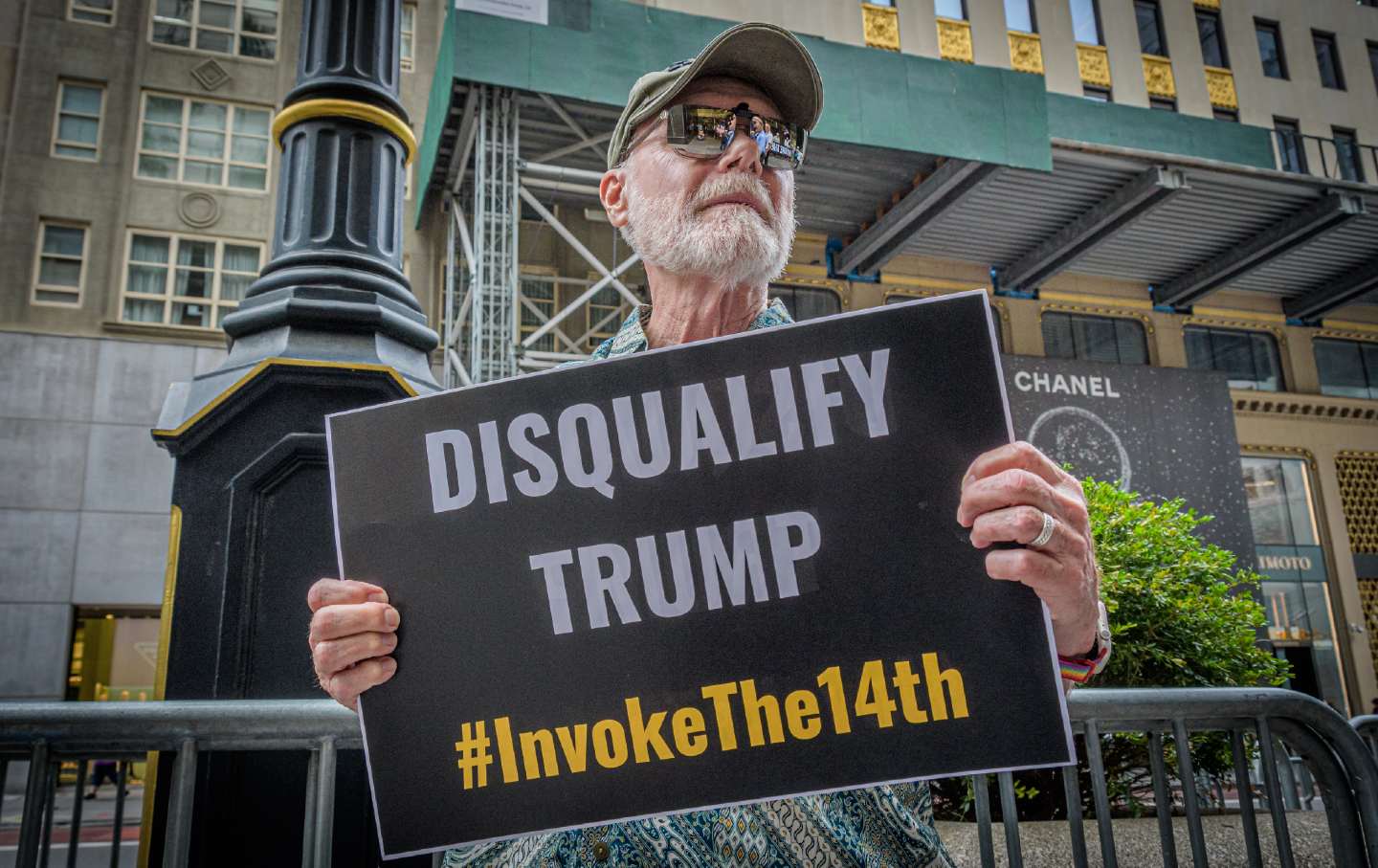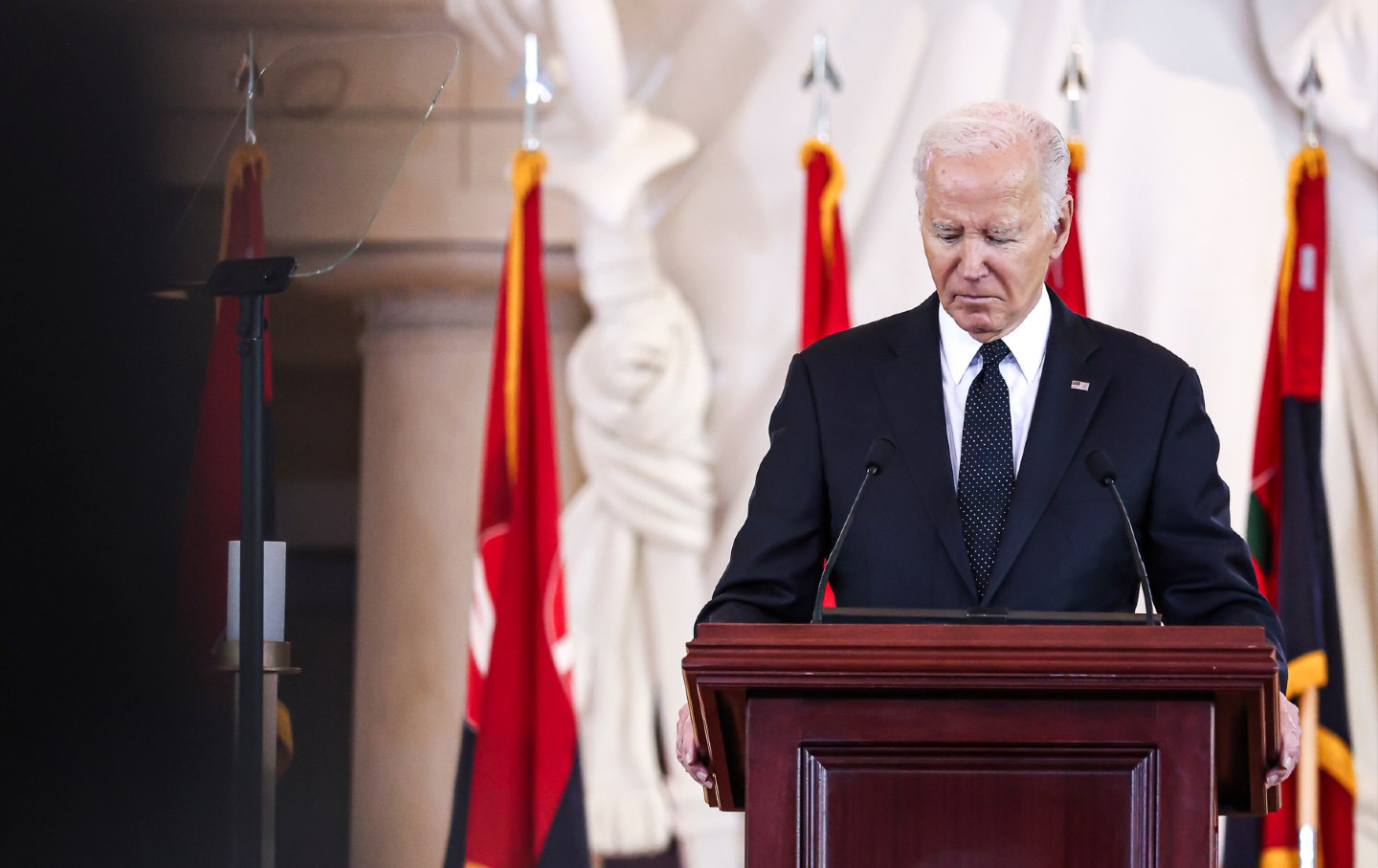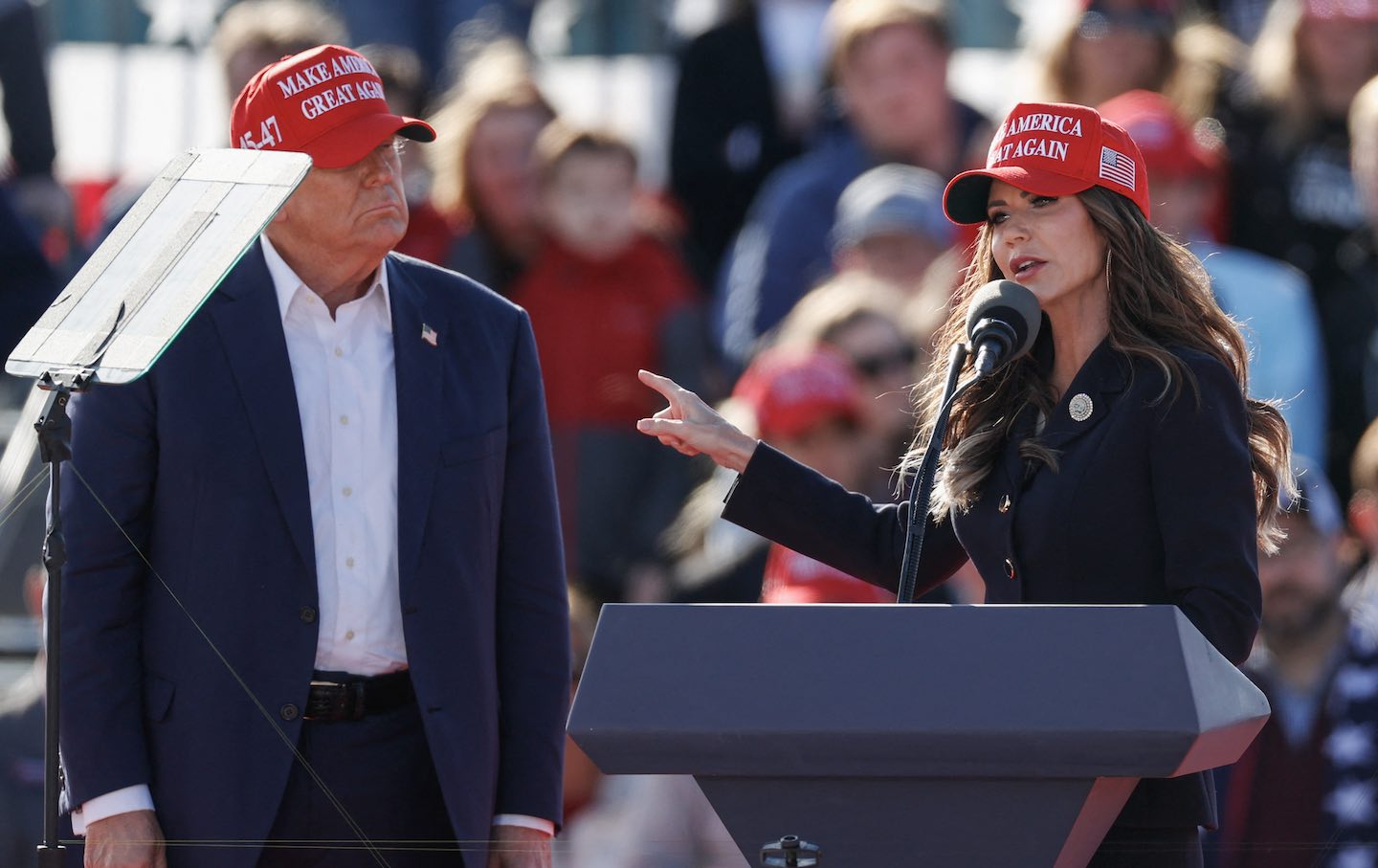The Colorado Court’s Ruling Banning Trump From the Ballot Is Sharp as Hell
While the ruling will be overturned by the Supreme Court, the conservative justices will have to tie themselves into a knot to do it.

A protester stands outside Trump Tower in Manhattan demanding that state governments disqualify former president Trump from appearing on ballots in 2024 under the 14th Amendment.
(Erik McGregor / LightRocket via Getty Images)On Tuesday, the Colorado State Supreme Court ruled, by a vote of 4-3, that Donald Trump is ineligible to be on the ballot for the upcoming Republican primary. The court found that Trump engaged in insurrection and, under Section 3 of the 14th Amendment, is disqualified from holding public office again, and thus cannot appear on the Republican primary ballot in Colorado. The judges stayed the ruling until January 4, 2024—the point at which Colorado is supposed to submit its primary ballot—in case the Supreme Court of the United States would like to intervene.
The Supreme Court will almost certainly intervene. And, just to be plain about it, the conservative-controlled court will almost certainly rule that Trump is allowed on the Colorado ballot. It would be wrong for anybody to get their hopes up: Republican-appointed justices are incredibly unlikely to kick the presumptive Republican nominee off of a presidential ballot.
But the Colorado opinion is designed, at least, to make the Supreme Court look very ugly and partisan when it bends over backward to save Trump and preserve his ability to threaten the country. That’s because the Colorado opinion is grounded in two things the Republicans on the court claim to hold dear: textualism and states’ rights.
For true textualists, the text of Section 3 couldn’t be more clear. It says, in full:
No person shall be a Senator or Representative in Congress, or elector of President and Vice-President, or hold any office, civil or military, under the United States, or under any State, who, having previously taken an oath, as a member of Congress, or as an officer of the United States, or as a member of any State legislature, or as an executive or judicial officer of any State, to support the Constitution of the United States, shall have engaged in insurrection or rebellion against the same, or given aid or comfort to the enemies thereof. But Congress may by a vote of two-thirds of each House, remove such disability.
It doesn’t say “convicted” of insurrection. It doesn’t say “unless it makes Jonathan Chait uncomfortable.” It says what it says: Government officers who engage in insurrection cannot be officers of the government again.
Donald Trump engaged in insurrection. That’s not me saying it, or Jack Smith saying it; that’s what the first court to hear this case, the Colorado state court, ruled at trial a few weeks ago. The trial court found that Trump engaged in insurrection, but twisted itself into an illogical knot to say that Section 3 didn’t apply to Trump because he was the president of the United States, and not an “officer” of the United States.
That was silly. Most of what the Colorado State Supreme Court did in its 215-page opinion unraveled that logical inconsistency, and applied a more accurate interpretation of Section 3 and Colorado state law to the facts (that Trump is an insurrectionist) that were found by the trial court. If the 14th Amendment means what it says, this isn’t a controversial opinion, legally speaking. Insurrectionists cannot hold office again.
If the US Supreme Court intervenes and overrules Colorado, not only will it be going against the plain text of the 14th Amendment; it will also be trampling over Colorado’s right to interpret its own state laws. As you may have heard, “states’ rights” is kind of a big thing in conservative circles. Remember, it’s conservatives who think states have the right to gerrymander away the voting power of racial minorities because of “states’ rights.” They think the states can limit voting hours and deny early voting because of “states’ rights.” In 2013, in Shelby County v. Holder, Chief Justice John Roberts ruled that the federal government can’t even use the 15th Amendment and the Voting Rights Act to stop the Confederate states from changing their voting laws back to Jim Crow procedures meant to disadvantage Black voters… because of “states’ rights.”
Now, the Colorado Supreme Court has gone and used the conservatives’ own obsession with states’ rights against them. Literally. The court quoted Justice Neil Gorsuch in an election law opinion from when he was a judge on the US Court of Appeals for the 10th Circuit, which oversees Colorado. Back then, Gorsuch wrote that “a state’s legitimate interest in protecting the integrity and practical functioning of the political process…permits it to exclude from the ballot candidates who are constitutionally prohibited from assuming office.”
The case that line comes from, Hassan v. Colorado, is directly on point with the Trump case. In that case, a man named Abdul Karim Hassan wanted to run for president. Hassan was a naturalized citizen, but the Constitution says that only “natural born” citizens are eligible to become president. A judge in Colorado ruled that Hassan could not be placed on the ballot in the state because he could not assume office if elected.
Hassan sued. Hassan lost, with Neil Gorsuch explaining that Colorado was perfectly allowed to exclude people from the ballot who would be ineligible under a strict textual reading of the Constitution to hold office. I’m sure it must be annoying for Neil to have his own xenophobic, literalistic ruling spit back in his face.
Annoying, but not insurmountable. Despite the fact that the text of the law, conservative ideology, and some of the justices’ own words are on the side of Colorado in this case, I fully expect the Republicans on the Supreme Court to ignore all that and restore Trump to the Colorado ballot. You see, the problem with beating conservatives at their own game is that they don’t care about their own rules. It’s easy for them to make up new rules that contradict the old ones, as they go along, because they are not bound by principle. They’re only concerned about power.
Popular
“swipe left below to view more authors”Swipe →There are many ways the conservatives can wriggle out of their own ideology now that their so-called logic no longer helps them. Perhaps they’ll read “convicted” of insurrection into the amendment, even though that word doesn’t exist in the text. Perhaps they’ll say that the case is not “ripe”—which in legalese means that the case is not ready for the court to make a ruling on—because it deals only with the primary ballots and not the general election ballots. Perhaps they’ll say we’re “too close” to an election to follow the rules (they’ve done that before).
The easiest thing for the Supreme Court to dispute might be whether Section 3 is “self-executing”—which is a technical legal question the Colorado Supreme Court devoted a lot of time to in its opinion. Some constitutional amendments or clauses require an act of Congress before they’re “executed” or, in other words, become real law. My favorite example of this is Prohibition. The 18th Amendment gave Congress the authority to prohibit alcohol, but that authority didn’t mean anything until the passage of the Volstead Act. It was the Volstead Act, not the 18th Amendment, that defined what Prohibition was, what was banned, who could be punished for drinking, and how.
Other amendments are “self-executing” in that they don’t need acts of Congress to make them real. The 13th Amendment, for instance, did not require the passage of a national anti-slavery act. Instead, once the 13th Amendment was ratified, slavery was illegal (but big ups to Ulysses S. Grant for actually enforcing the thing).
In this case, the Colorado Supreme Court says that the 14th Amendment is like the 13th: Congress doesn’t need to pass a law defining insurrection or specifying who gets kicked off the ballot; it simply prohibits insurrectionists from returning to office. That makes sense when you look at the history of the 14th Amendment, and the other Reconstruction Amendments, taken as a whole. But Trump’s lawyer argued, and the Supreme Court could agree, that Section 3 requires a specific act of Congress before it can be enforced. That might be a cute way for the court to stand by their man and let Trump get back on the ballot, while pretending that it’s all Congress’s fault.
Most likely, the conservatives will just adopt some garbled amalgam of all of those arguments to restore Trump back to the ballot. That’s basically what the conservatives on the court did in Bush v. Gore. In that case, in which the Supreme Court anointed George W. Bush president on its own authority instead of following the state law in Florida and counting all the votes, there was no real conservative through-line. They just said a bunch of stuff to justify their sudden abandonment of states’ rights to make sure that Republicans took control of the White House.
However they do it, I seriously doubt that they will stand on their textualist and states’ rights principles and allow Colorado to disqualify Trump from the ballot. Indeed, if they do, then lawsuits pending against Trump in many other states would suddenly take on new life. The Republicans on the Supreme Court don’t want that smoke.
The conservatives will likely kill this, quickly, in the next few weeks. They will look bad doing it, but they’re appointed for life and know that elected Democrats lack the will to police their conduct. The main upshot will likely be that the staff at Mar-a-Lago has to clean a lot of ketchup off the walls during this holiday season.
That said, perhaps since it’s the holidays, I’m still guilty of believing there is a chance the Supreme Court sides with Colorado. There’s a chance that Gorsuch listens to himself. There’s a chance that Roberts’s political preferences are such that he understands the grave threat a second Trump presidency poses to the country and the Supreme Court’s own power. It’s a fool’s chance, but I choose to believe that there’s a chance that the law prevails over Trump.
There is probably a universe out there where Trump is kicked off the ballot; it’s just unlikely that we’re lucky enough to live in that one.
Thank you for reading The Nation!
We hope you enjoyed the story you just read, just one of the many incisive, deeply-reported articles we publish daily. Now more than ever, we need fearless journalism that shifts the needle on important issues, uncovers malfeasance and corruption, and uplifts voices and perspectives that often go unheard in mainstream media.
Throughout this critical election year and a time of media austerity and renewed campus activism and rising labor organizing, independent journalism that gets to the heart of the matter is more critical than ever before. Donate right now and help us hold the powerful accountable, shine a light on issues that would otherwise be swept under the rug, and build a more just and equitable future.
For nearly 160 years, The Nation has stood for truth, justice, and moral clarity. As a reader-supported publication, we are not beholden to the whims of advertisers or a corporate owner. But it does take financial resources to report on stories that may take weeks or months to properly investigate, thoroughly edit and fact-check articles, and get our stories into the hands of readers.
Donate today and stand with us for a better future. Thank you for being a supporter of independent journalism.
Thank you for your generosity.
More from The Nation

What Biden’s Holocaust Speech Ignored What Biden’s Holocaust Speech Ignored
The president’s ahistorical account of Gaza failed to acknowledge the discomfiting truth that brutalized communities can visit the same traumas on others.

Stormy Daniels Takes the Stand Stormy Daniels Takes the Stand
The trial isn’t about Trump’s bad behavior but committing business crimes to win an election. It’s a shame that Daniels’s story is being ruled largely irrelevant in the courtroom.

The Right’s Partners in Weaponized Policymaking The Right’s Partners in Weaponized Policymaking
In remarkably short order, Donald Trump has transformed from the face of a hard-right insurgency in the GOP to the caretaker of the party’s future. This change has been anything bu…

Protest Voting Is a Road to Nowhere Protest Voting Is a Road to Nowhere
The system may be deeply imperfect, but the stakes are too high to refuse to cast a ballot for Biden on principle.

Kristi Noem Is the Latest Republican to Learn You Can’t Out-Trump Donald Trump Kristi Noem Is the Latest Republican to Learn You Can’t Out-Trump Donald Trump
The South Dakota governor's attempt at mimicking the former president’s obstreperous public image has fallen disastrously flat.



